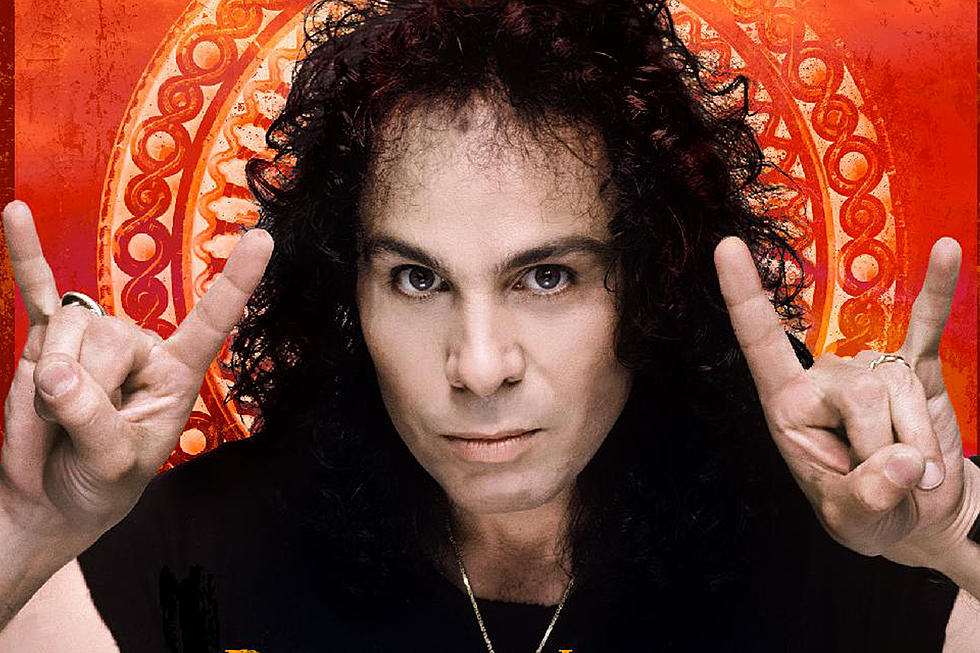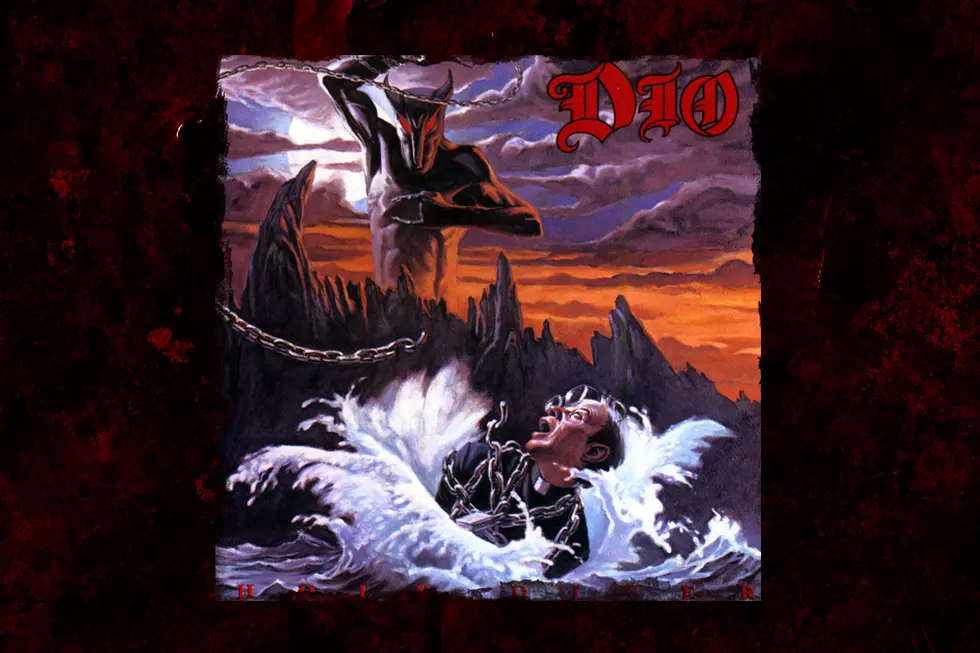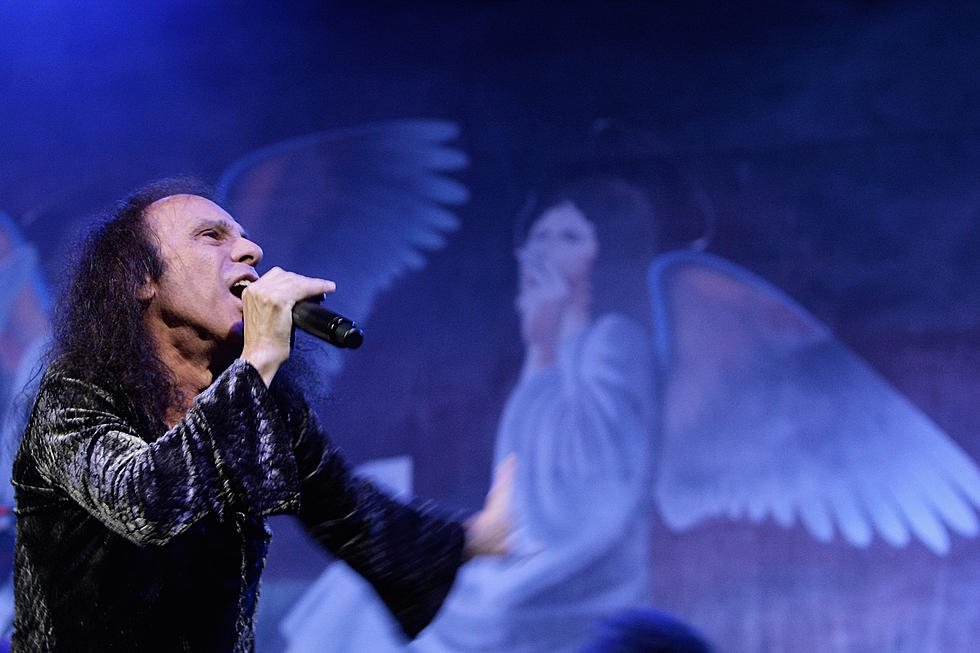
Wendy Dio on Ronnie: ‘There’s a Lot of Unreleased Music’
In the years since Ronnie James Dio died in 2010 after battling stomach cancer, there has been a steady stream of reissues. Most recently, there were 2021 expansions of his first two albums with Black Sabbath, 1980's Heaven and Hell and its 1981 follow-up Mob Rules.
Wendy Dio, longtime manager and widow of the late singer, reveals to UCR that fans can look forward to similar reissues of the classic '80s-era Dio band albums, including a newly commissioned remix of the landmark 1983 LP Holy Diver.
With the recent publication of Ronnie's memoir, Rainbow in the Dark, Wendy discusses the upcoming releases as well as her memories of her husband's time with Black Sabbath.
Ronnie’s period with Black Sabbath was, for a long time, underrated. The Heaven & Hell band reunion was a dream come true for fans. Can you take us back to some of the early moments when that reunion was coming together?
I am so happy that Ronnie got to play with the band again. Everybody was just playing so well. The friendship was there the whole time. It was a really strong pact and friendship, and I was so happy that happened before Ronnie passed away, because he really, really loved playing with those guys, I think more than anyone else. They were just such amazing players, Tony [Iommi], Geezer [Butler], Vinny [Appice] and Ronnie - they were so very strong and having such a good time playing. It was such a shame that it came to an end because of illness.
Tony Iommi told us earlier this year that the addition of Ronnie sent him in a new direction and gave him new challenges. He had to work harder because Ronnie was a very different singer. What are your memories of Ronnie coming home after some of those days in the studio working on the Heaven and Hell album?
We were all staying at the Bee Gees house down in Miami. They were all working together at the house and rehearsal, and then they’d go down to the studio. Everybody was having a great time, even though there were a lot of problems going on. Geezer had some personal problems and had to leave. Bill [Ward] was sometimes there and sometimes not there. There were trials and tribulations, but actually Ronnie was very, very happy. I think he and Tony were very happy to have found each other.
And Ronnie writes in the book about the feeling of taking the stage with Sabbath for the first time. Where were you for those first shows in Germany? What was the scene in your memory?
Ronnie was very nervous about taking [Ozzy Osbourne's] place, which he never intended to do. I never ever think that Ronnie took Ozzy’s place. I always think that there’s two Sabbaths, and I think they were both really good. Obviously, Ozzy was the innovator, and he was a great showman in his day. He was a fantastic showman. That was part of the Sabbath sound. But then Ronnie came in and he made it a bit more melodic or more modern. He made Sabbath modern, and he made it more listenable. I think that was the difference between the two bands. But I wouldn’t say that one was better than the other, and Ronnie never did either. But he was very nervous in the beginning, coming in there and having to fill Ozzy’s shoes. He got a few people booing him, and a few people spitting and stuff. But after a few shows, I think people really realized, This is great music, let’s listen to this.
There have been reissues of the Mob Rules and Heaven and Hell albums this year and, in 2019, the Dehumanizer album. Dehumanizer includes part of a live show from Tampa in 1992. What sort of discussion has there been about releasing the full live show from that performance?
There’s lots of different things the record company wants to do and so on. And we go back and forth on it. I don’t know why the whole show wasn’t [released]. Maybe there was some technical problems or something. I don’t know. But I do know that when Dehumanizer came out in 1990, grunge had kind of come in, so it didn’t get the recognition that it should have. I’m really happy that it got rereleased. I think it’s a really good record. There’s some great stuff on there, and I think it’s a great opportunity for people to hear it now.
There have been some great Dio reissues the past couple of years. What else would you still like to see come out?
Warner Bros. has the first six albums Ronnie recorded, and they wanted to bring them out this year. I said no, because we already had the [reissues from] BMG - I own the other four albums and licensed those to them. BMG were bringing those out and doing a very good job. We have a book and a comic coming out. I said there’s too much, you can’t flood the market. I don’t ever want to flood the market. We are going to bring out all of the reissues of the first six Dio albums next year, but they will be with lots of bonus [material], lots of live stuff, [things] people have never heard before. We are remixing Holy Diver with a very well-known producer.
What led to the decision to remix that record?
Warner Bros. wanted to do it. They asked me about it. I said if we’re going to do that, then I want to pick someone who is current and could do justice to Ronnie. We spoke to a few people ... but if someone’s going to do it, they have to know what they’re doing and [be able to] make it a more modern sound. The talk was of Wyn Davis doing it. He’s Ronnie’s engineer, and he’s fabulous. But he wouldn’t take liberties with Ronnie’s music, because he was so close to it. So if we’re going to remix it, do it with someone who has a different perspective altogether and let’s see what happens.
What have you uncovered for the first six albums?
We’re still going through it. We have a lot of unreleased material. We have a lot of stuff, and we’re going through a [lot], but there will be some unreleased material on there. I have a whole vault full of hundreds and hundreds of tapes. It’s taking a long time to go through it. Wyn Davis and I are going through everything.
I was happy when you all put out the Dio Donington set.
I have a bunch of [other things]. When Ronnie would record a song, he had a home studio. He would go down there and have his little drum machine, and record something that he wanted to record. Because Ronnie wasn’t just a lyricist. He was a musician as well, he played guitar, he played bass, he played trumpet, he played piano. So he would go down there and put stuff down. Maybe they’d change it around a bit. And then he would go to the studio with the band and they’d put it down properly. I have all of those recordings when he was in the studio. I have hundreds of them. We’re going to go through some of that stuff. Obviously, Ronnie was a perfectionist, so I’m not going to ever put anything out that I don’t think Ronnie would approve. But we are going through all of this stuff to see if there’s interesting stuff that fans would like to hear.
Top 50 Classic Heavy Metal Albums
More From KKTX FM










